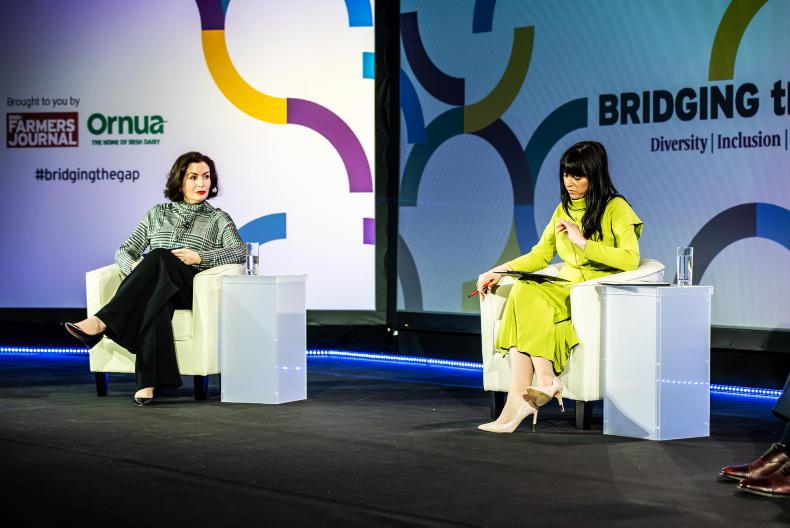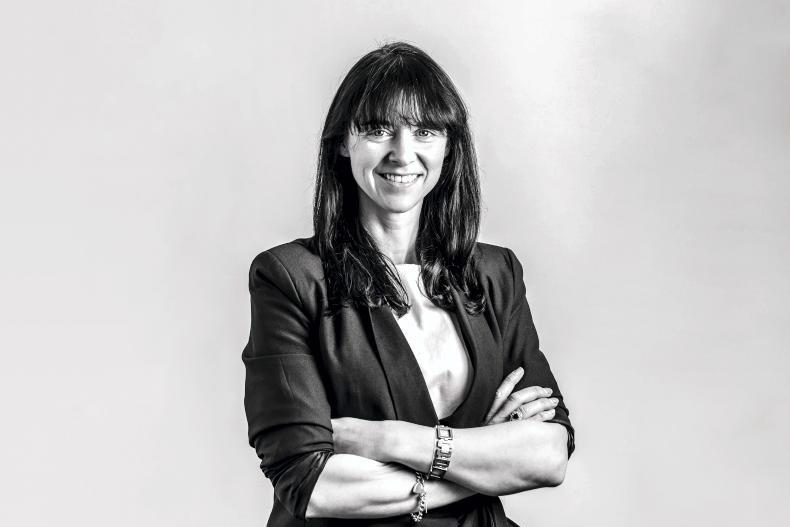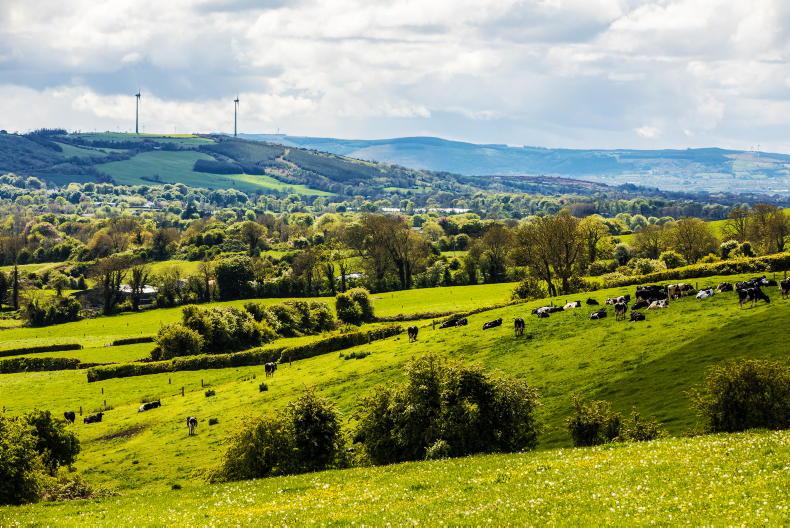I recently completed a college module on economics. A guest lecturer – very familiar to us in the agri industry – was drafted in for a slot on environmental economics. And it was on this lecture that I learned about the “tragedy of the commons”.
This is a problem that occurs when individuals neglect the wellbeing of society in the pursuit of personal gain. The concept originated when British economist William Forster Lloyd used the example of the effects of unregulated grazing on “common” land.
The reference was in relation to climate change, but following our recent Bridging the Gap event, I thought of a different application. That by failing to act on diversity for personal reasons, companies are failing the industry at large.

At the Bridging the Gap event at the Kilashee House Hotel was Francesca McDonagh, CEO of Bank of Ireland; Alastair Blair of Accenture; Amii McKeever, editor of ICL; John Jordan, CEO of Ornua, Louise Grubb of Trivium Vet and Justin McCarthy, editor of IFJ. \ Philip Doyle
At the event, Ornua CEO John Jordan referred to cognitive diversity. This is the inclusion of people who have different styles of problem-solving and can offer unique perspectives because they think differently. Francesca McDonagh, CEO of Bank of Ireland spoke of three things that stood out to me. First, when you are the CEO of a company, it is relatively easy to make things happen. Second, in relation to all male boards she called it out straight: “Do people genuinely think they got this through meritocracy?” The third was in relation to having diversity targets. And if you miss those targets, asking yourself why.

Francesca McDonagh in conversation with Amii McKeever at the Bridging the Gap event. \ Philip Doyle
John Jordan also said that to secure diversity, succession planning had to be active. In organisations where people are elected or volunteer, implementing a succession plan can present other challenges. There is an obvious lack of diversity on the boards of agri companies, co-ops and in the leadership of the farm organisations. Some are proactively trying to address this. Macra has made a huge jump forward following their recent elections with three female vice presidents. Of the 13 directors, five are female.
The IFA also made progress in recent years with an increase in the number of female county chairs and younger members drafted into the committee structure. Previously when surveyed, people mentioned the recycling of officers as a reason they did not get involved. A preconception has formed, fear that talent could be lost from the organisation if the ability to circulate from committee to committee was indefinitely removed. But to quote Francesca again: “This (diversity targets) isn’t about bias or unfair advantage, it’s just about levelling the playing field.”
Solutions can be found if people in positions of power are willing to support them
A question posed in advance of the event related to the lack of female representation on Irish co-op boards. I put this to the Irish Co-Operative Organisation Society (ICOS). They replied, acknowledging the issue.
Currently on dairy co-op boards, the number of female directors ranges from zero to two. ICOS believe that the principle barrier is the shareholding structure with shares traditionally owned by the man. There is a mechanism where family members can be named as joint shareholders.
Solutions can be found if people in positions of power are willing to support them.
A tragedy of the commons in the agri industry would be a lack of action. By not moving aside to let new people progress on boards and committees, individuals neglect the wellbeing of their fellow farmers and future farmers for their own personal gain. This leads to a lack of that vital cognitive diversity to everybody’s detriment.
Read more
You won’t admit it, but do you think equality is all a bit 'fluffy'?
'Seven John Jordan’s would be pretty boring'
I recently completed a college module on economics. A guest lecturer – very familiar to us in the agri industry – was drafted in for a slot on environmental economics. And it was on this lecture that I learned about the “tragedy of the commons”.
This is a problem that occurs when individuals neglect the wellbeing of society in the pursuit of personal gain. The concept originated when British economist William Forster Lloyd used the example of the effects of unregulated grazing on “common” land.
The reference was in relation to climate change, but following our recent Bridging the Gap event, I thought of a different application. That by failing to act on diversity for personal reasons, companies are failing the industry at large.

At the Bridging the Gap event at the Kilashee House Hotel was Francesca McDonagh, CEO of Bank of Ireland; Alastair Blair of Accenture; Amii McKeever, editor of ICL; John Jordan, CEO of Ornua, Louise Grubb of Trivium Vet and Justin McCarthy, editor of IFJ. \ Philip Doyle
At the event, Ornua CEO John Jordan referred to cognitive diversity. This is the inclusion of people who have different styles of problem-solving and can offer unique perspectives because they think differently. Francesca McDonagh, CEO of Bank of Ireland spoke of three things that stood out to me. First, when you are the CEO of a company, it is relatively easy to make things happen. Second, in relation to all male boards she called it out straight: “Do people genuinely think they got this through meritocracy?” The third was in relation to having diversity targets. And if you miss those targets, asking yourself why.

Francesca McDonagh in conversation with Amii McKeever at the Bridging the Gap event. \ Philip Doyle
John Jordan also said that to secure diversity, succession planning had to be active. In organisations where people are elected or volunteer, implementing a succession plan can present other challenges. There is an obvious lack of diversity on the boards of agri companies, co-ops and in the leadership of the farm organisations. Some are proactively trying to address this. Macra has made a huge jump forward following their recent elections with three female vice presidents. Of the 13 directors, five are female.
The IFA also made progress in recent years with an increase in the number of female county chairs and younger members drafted into the committee structure. Previously when surveyed, people mentioned the recycling of officers as a reason they did not get involved. A preconception has formed, fear that talent could be lost from the organisation if the ability to circulate from committee to committee was indefinitely removed. But to quote Francesca again: “This (diversity targets) isn’t about bias or unfair advantage, it’s just about levelling the playing field.”
Solutions can be found if people in positions of power are willing to support them
A question posed in advance of the event related to the lack of female representation on Irish co-op boards. I put this to the Irish Co-Operative Organisation Society (ICOS). They replied, acknowledging the issue.
Currently on dairy co-op boards, the number of female directors ranges from zero to two. ICOS believe that the principle barrier is the shareholding structure with shares traditionally owned by the man. There is a mechanism where family members can be named as joint shareholders.
Solutions can be found if people in positions of power are willing to support them.
A tragedy of the commons in the agri industry would be a lack of action. By not moving aside to let new people progress on boards and committees, individuals neglect the wellbeing of their fellow farmers and future farmers for their own personal gain. This leads to a lack of that vital cognitive diversity to everybody’s detriment.
Read more
You won’t admit it, but do you think equality is all a bit 'fluffy'?
'Seven John Jordan’s would be pretty boring'











SHARING OPTIONS